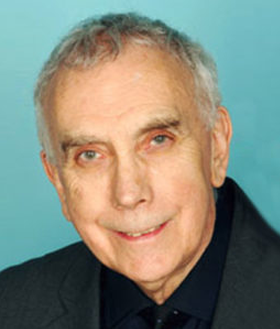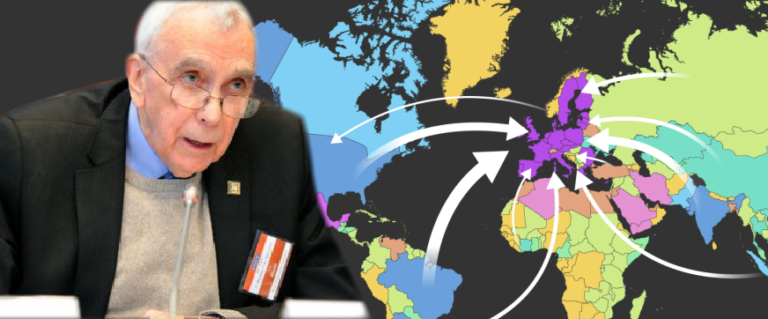heading
2008: Professor John Anthony Allan
Professor John Anthony Allan from King’s College London and the School of Oriental and African Studies has been named the 2008 Stockholm Water Prize Laureate. Professor Allan pioneered the development of key concepts in the understanding and communication of water issues and how they are linked to agriculture, climate change, economics and politics.

People do not only consume water when they drink it or take a shower. In 1993, Professor Allan, 71, strikingly demonstrated this by introducing the “virtual water” concept, which measures how water is embedded in the production and trade of food and consumer products. Behind that morning cup of coffee are 140 litres of water used to grow, produce, package and ship the beans. That is roughly the same amount of water used by an average person daily in England for drinking and household needs. The ubiquitous hamburger needs an estimated 2,400 litres of water. Per capita, Americans consume around 6,800 litres of virtual water every day, over triple that of a Chinese person.
Virtual water has major impacts on global trade policy and research, especially in water-scarce regions, and has redefined discourse in water policy and management. By explaining how and why nations such as the US, Argentina and Brazil ‘export’ billions of litres of water each year, while others like Japan, Egypt and Italy ‘import’ billions, the virtual water concept has opened the door to more productive water use. National, regional and global water and food security, for example, can be enhanced when water intensive commodities are traded from places where they are economically viable to produce to places where they are not. While studying water scarcity in the Middle East, Professor Allan developed the theory of using virtual water import, via food, as an alternative water “source” to reduce pressure on the scarcely available domestic water resources there and in other water-short regions.
In its Citation, the International Nominating Committee Wrote:
Professor Tony Allan is awarded for the Stockholm Water Prize for his unique, pioneering and long lasting work in education and raising the awareness internationally of interdisciplinary relationships between agricultural production, water use, economies and political processes. The introduction of new important concepts like “virtual water”, the use of the “problemshed” concept to emphasise that the most serious water sector problems are remedied outside the water sector, that energy is the big issue and above all that understanding the political landscape is the most important factor in the water science/policy nexus has created both innovative new research and actions from both individuals, large organisations and NGOs. The improved understanding of trade and water management issues on local, regional and global scales are of the highest relevance for the successful and sustainable use of water resources.
The Stockholm Water Prize which Professor Allan will receive is a global award founded in 1990 and presented annually by the Stockholm Water Foundation to an individual, organisation or institution for outstanding water-related activities. The activities can be within education and awareness-raising, human and international relations, research, water management and water-related aid. The Stockholm Water Prize Laureate receives USD 150,000 along with a glass sculpture, and will be presented August 21 in the Stockholm City Hall. H.M. King Carl XVI Gustaf of Sweden is the Patron of the Stockholm Water Prize.
The Founders of the Stockholm Water Prize are Swedish and international companies who strive to push sustainability forward in the water sector. The Founders of Stockholm Water Prize working in co-operation with the City of Stockholm are: Bacardi, Borealis & Borouge, DuPont, Europeiska Insurance, Fujitsu Siemens Computers, General Motors, Grundfos Management, Hewlett Packard, ITT Water & Wastewater, Kaupthing Bank Sverige, Kemira Water, KPMG Sweden, Läckeby Water, P&G, Ragn-Sells, Scandic, Scandinavian Airlines (SAS), Siemens AG, Snecma, SJ, Uponor and Water Environment Federation.
Promoting Smarter Water Decisions
As a scientist, educator and advisor, Professor Allan has built essential knowledge and communication tools for sustainable and efficient water resource management and policy. His research deploys a wide range of environmental, economic, social and political theory to give insights on global water resources and the extent to which they can be made sufficient to meet the needs of future populations. Because of his work, policy makers, scientists, water professionals and the general public have greater awareness of the role of water in the production of different types of products and its impact on global trade and economy. Virtual water remains a central and active component of scientific research and policy formulation, and has empowered individual consumers to affect water management on a global scale.
“Beyond the Box” Thinker
Professor Allan has furthermore developed the idea and terminology of “hydro-hegemony” and the “problemshed.” This work has led to better understanding of potential and real conflicts in transboundary regions such as the Nile Basin, where water resources are shared between countries, while providing perspective on economic and political processes that can make food and water security possible for all nations in such water basins. He remains a leading voice for sustainable water development and expert advisor on balancing population growth and increasing food demand in developing countries, institutional reform, valuing water, conflict resolution, and on the Middle East and North Africa (MENA) region.
A Lifetime of Achievement
Professor Allan has authored or edited seven books and has published over 100 papers in political science, natural resource management, and interdisciplinary water journals. He has also educated more than 1100 current or future water professionals. He has worked for over 35 years with the MENA region and has advised on joint management of shared water resources on every basin in the Middle East. He also served as editor for the scientific journal Water Policy and as a consultant for numerous governments, the World Bank and the European Union. His keen perceptions and scientific analysis have inspired new thinking on the spectrum of water challenges, and is described by many as one of the most influential thinkers in the global water sector today.
Tony Allan passed away in 2021.
